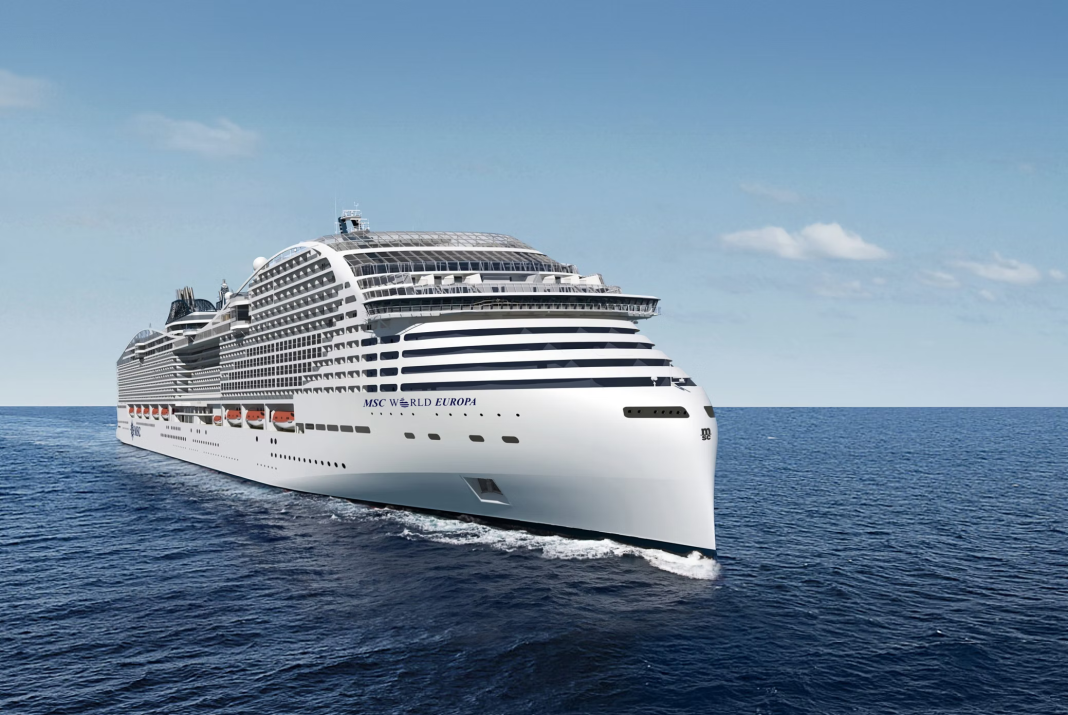The United Arab Emirates (UAE) will be the base next winter for the biggest and most environmentally high-performing passenger ship to sail in the Middle East, MSC World Europa.
The vessel’s Swiss-based owner and operator MSC Cruises will also dedicate a second ship, MSC Opera, to the Gulf region for the 2022/23 sailing season as it aims to further strengthen its position as the region’s number one line for holidays at sea.
The announcement was made by MSC Cruises’ CEO Gianni Onorato following the official opening this week by His Highness Sheikh Hamdan Bin Zayed Al Nahyan, the ruler’s representative in the Al Dhafra region of the UAE, of a new jetty for passenger ships at Sir Bani Yas Island.
This development, according to MSC Cruises, will be greatly welcomed by cruise holidaymakers visiting the incredible island off the coast of Abu Dhabi.
Mr Onorato hailed the cruise sector in the UAE as being an integral part of its dynamic tourism industry, paid tribute to the health and safety measures throughout the country and described MSC Cruises’ business outlook for next winter in the UAE and the Gulf as ‘very positive’ as a result.
Gianni Onorato, CEO, MSC Cruises, said, “The UAE is a very important market for us and next winter we are going to deploy our newest addition to our fleet – MSC World Europa – and further increase our capacity from this year with the introduction of a second ship, MSC Opera, in recognition of the region’s ever growing status in the cruise sector.
“MSC World Europa will redefine the cruise experience with a variety of never-before-seen features unlike anything at sea today and the vessel will be an additional benefit to the UAE’s tourism industry. The ship will attract many international passengers from around the world, especially from Europe, and we hope to also see strong interest from guests from the Gulf Cooperation Council, especially the UAE.
“One of our newest ships MSC Virtuosa, is currently deployed in the Arabian Gulf and although there are challenges ashore associated with the global pandemic, we have worked closely with the relevant authorities throughout the region to ensure the health and safety of our passengers, crew and the communities that the ship visits. The combination of onboard measures along with those ashore have been extemely effective, as demonstrated by the fact that MSC Viruosa is one of our best performing ships during the winter season.”
Deployment in the Arabian Gulf
MSC Virtuosa on 26 March will finish her scheduled voyages in the UAE and be replaced by MSC Bellissima between 2 April and 25 June, 2022. This is the first time MSC Cruises has extended its sailing season in the Gulf and offer spring break holidays at sea.
MSC World Europa from December will be based in the UAE offering 7-night cruises from Dubai and Abu Dhabi to Sir Bani Yas Island, Dammam in Saudi Arabia and Doha in Qatar.
MSC Opera will offer a different and contrasting 7-night itinerary from Dubai and Abu Dhabi also calling at Sir Bani Yas Island. Guests can then discover Oman with a call at the capital city Muscat, one of the oldest cities in the Middle East, and Khasab, the country’s most northerly city. The cruise finishes with an overnight in Dubai to give guests plenty of time to explore the incredible metropolis.
About MSC World Europa
MSC World Europa is currently under construction at the Chantiers de l’Atlantique shipyard in Saint-Nazaire, France and will be delivered in October 2022 before she sets sail for the Arabian Gulf to operate cruises from December until March 2023.
The 2,626 cabin vessel will be able to accommodate up to 6,762 passengers, have a gross tonnage of 205,700 GT and is 333.3 metres in length. The ship will be powered by liquified natural gas (LNG), the first vessel in MSC Cruises’ fleet to use the cleanest fuel currently available at scale for ocean cruise ships.
MSC Cruises shares the UAE’s ambition to reach net zero emissions by 2050 and the LNG-powered MSC World Europa represents a major milestone in the company’s strategy to achieve its goal of eradicating carbon emissions.









